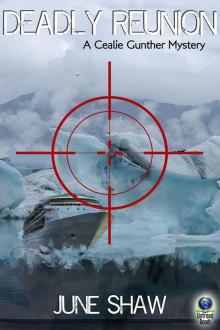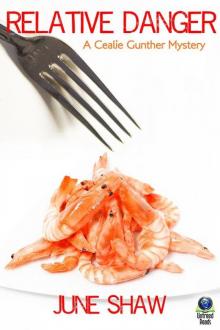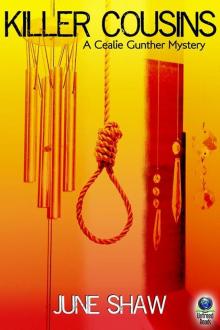Relative Danger Read online
Table of Contents
Copyright
Relative Danger
Dedication
Chapter 1
Chapter 2
Chapter 3
Chapter 4
Chapter 5
Chapter 6
Chapter 7
Chapter 8
Chapter 9
Chapter 10
Chapter 11
Chapter 12
Chapter 13
Chapter 14
Chapter 15
Chapter 16
Chapter 17
Chapter 18
Chapter 19
Chapter 20
Chapter 21
Chapter 22
Chapter 23
Chapter 24
Chapter 25
Author Bio
Relative Danger
By June Shaw
Copyright 2013 by June Shaw
Cover Copyright 2013 by Ginny Glass and Untreed Reads Publishing
The author is hereby established as the sole holder of the copyright. Either the publisher (Untreed Reads) or author may enforce copyrights to the fullest extent.
Previously published in print, 2006
This ebook is licensed for your personal enjoyment only. This ebook may not be resold, reproduced or transmitted by any means in any form or given away to other people without specific permission from the author and/or publisher. If you would like to share this book with another person, please purchase an additional copy for each person you share it with. If you’re reading this book and did not purchase it, or it was not purchased for your use only, then please return to your ebook retailer and purchase your own copy. Thank you for respecting the hard work of this author.
This is a work of fiction. Any resemblance to the living or dead is entirely coincidental.
Also by June and Untreed Reads Publishing
Killer Cousins
Deadly Reunion
http://www.untreedreads.com
Relative Danger
June Shaw
For my hunk,
Bob
Chapter 1
I drove across town following Chicken Boy, anticipation fluttering in my chest like the big yellow feathers flapping through the open window of his truck.
We headed west on the freeway, and people in oncoming cars laughed at the chicken driving ahead of me. I was glad the guy I rented from the costume shop brought pleasure to so many—until a half-dozen feathers flew off his wing and stuck to my windshield. A small boy in a passing car pointed and laughed like crazy, but all I could see was a wing full of yellow coating my vision. I turned on my windshield wipers, and feathers floated off to the right, making me notice the tops of nearby buildings and billboards. The colors of one made me catch my breath.
I spied only part of the sign, but even without my bifocals knew the cayenne-colored letters on a muted green background would spell Cajun Delights. And that would mean Gil Thurman, my ex-lover, was in town to open another of his restaurants. I hadn’t been to Chicago in a while, but family members would have told me if Gil had a restaurant here before now.
To stop thinking about him, I turned the radio volume up until golden oldies vibrated in my head, and I had to lower the window to let some sound out. A warm breeze whipped in like a hot flash, engulfing me in exhaust fumes from five-fifteen traffic.
The teen in costume chugged ahead toward the suburbs, and I backed my foot from the gas pedal to keep from ramming him. Twisting my shoulders to my music, I followed until finally we rolled into a neighborhood holding modest brick and stucco houses with clean lawns. I parked at the curb and hurried up the steps of the redbrick home I hadn’t visited in six months.
Chicken Boy waddled up, and I stepped back while he rang the buzzer near the front door. I remained hidden by his bulk, waiting to see my granddaughter Kat and her reaction. She was seventeen, old enough to try to maintain her cool, but still enough of a kid to be thrilled by the arrival of an eight-foot chicken.
Chicken Boy mumbled through his beak, “Nobody’s answerin’, Mrs. Gunther.”
“Try again, please,” I said.
He smashed in the doorbell with a feathered wing.
The door was yanked open. “Yes?” Kat’s voice sounded upset. “Oh, you must have the wrong place,” she said, her tone softer.
Chicken Boy sang, “Happy graduation to you. Happy graduation to you. Happy grad-u-a-tion—”
He faltered for the next words, so I picked up his tune and finished the song I’d composed. “—to the girl who’s about to finish near the top of her cla-ass. Happy graduation to you.” I sprang out from behind the chicken, spreading my arms.
My grandchild peered at my face. She stared at the fellow in costume. Kat’s hands covered parts of her eyes and tears hit their outer rims.
“Baby girl,” I said, cringing, “what’s wrong?” She fell into my arms, her head leaning down to my shoulder. Kat’s thin body trembled. I caught my breath, not prepared for this response, and held her close.
She drew back and her lips lifted at the edges, but she wiped dampness from her eyes. “Hi, Gram.”
“Hello, sweetie.”
She sniffled. “We never know when you’ll pop up in town.”
“I like for my visits to be surprises.”
“They always are.”
Chicken Boy stood beside us, watching. I handed him a tip, and he lumbered off.
Kat’s hand brushed russet hair off her face and I noticed that, even with no makeup, her cheekbones stood out like her daddy’s. Her nose remained slim like her mom’s. She had forest-green eyes and had sprung up much taller than my five feet, two inches. Her once budding curves now blossomed beneath a blue shirt and navy slacks. My grandchild had grown into a slender young woman, one with striking beauty.
“It’s always great to see you, Gram. And that was really sweet.” She nodded to indicate the boy heading for his truck. “But I doubt if I’ll be graduating near the top of my class.”
My stomach clenched. How could things have changed so much so soon?
“Come on in,” Kat said. She led the way through the living room that appeared dark, even with sunlight falling through lace curtains. Her tennis shoes squeaked on the polished wooden floor, and my mules made a sucking noise through the space that still felt like a shrine. Framed pictures of the dead lined the walls and tops of shiny tables, strangling life from the room. Each picture showed my daughter-in-law Nancy excited about life. She had been dead two years.
I lifted a snapshot of her on a swing in a playground. “She always looked so happy.”
Kat nodded, her face somber. We walked off to the kitchen filled with the scent of roasting meat. “Sit down, Gram. I’ll just be a minute.” She opened the broom closet door, and I sat at the table. Mauve curtains hung in the bay window, and a cheerful print with skinny piglets rimmed the walls. At least the kitchen retained Nancy’s spirit. She’d had a knack for lifting people’s moods. Her laughter was a salve for my son. She created a nurturing life for Kat. But Nancy needed a new heart, and nobody had died in time to give her one. She would have wanted Kat laughing now.
A squat ceramic pig with a smirk sat in the center of the table. I lifted his head and grabbed a cookie. “Hm, homemade chocolate chip. And still slightly warm.” I shut my eyes and savored warm melting chocolate, the experience involuntarily making me think of Gil Thurman. He’d often baked these after we had a tumble in bed, his special treat to say Love you, Cealie. I shrugged away thoughts of him and watched Kat.
“When the doorbell rang, I dropped the salt,” she said. Using a broom and dustpan, she attacked the spilled salt and its box on the floor. Before I could offer to help, she scooped up the mess and put everything away. Steam bubbled fro
m pot covers on the stove, and Kat scurried to lower the heat. She yanked covers from pots, releasing aromas that made my stomach growl. “The water almost boiled out of the potatoes I planned on mashing.”
She was cooking real mashed potatoes. No wonder she’d been so upset. Kat tried to do everything, and she did it perfectly.
“Come sit and relax,” I said, recalling a major lesson I’d learned from maturity. The constant attempt for perfection caused stress. Learning life’s lessons was one of the few positives I’d gleaned from aging. Kat settled beside me, and I said, “What happened? Your grades were always terrific.”
Her gaze shifted to the table. “A problem just changed everything.”
“Problem? Well I doubt if I could help with most of your honors classes, but I was pretty good in some subjects.” I thought about pulling out the papers I’d shoved into my purse. I’d brought one of my high school report cards and my college transcript, thinking Kat would laugh while comparing her grades to mine. Math had given me some problems; so had some of the sciences. I didn’t think she had difficulty with any subject. But this didn’t seem the right time for trying to get her to chuckle. “Let me look at your books. Maybe I could call out some things for you.”
“It’s not that, Gram. Somebody from school died.”
“Oh Kat, not a student?” She shook her head, and I exhaled with relief. Clasping her fingers, I still dreaded. “A teacher?”
“No, a custodian. His funeral’s tomorrow.”
“Oh, the poor man. And you were close to him?”
Again she shook her head. “He’d only been at school a few months. I didn’t know him well.”
An acquaintance’s death caused her grades to plunge? Confusion settled inside me, offset by a rumble in the driveway. Kat jumped up. She darted to the stove and turned knobs. “Dad’s here.”
“His truck sure is loud.”
“He brings a lot of customers’ cars and trucks home to work on. It gives him something to do in the evening.”
I glimpsed my son through the bay window. Roger wore khaki clothes coated with grease stains. He had his father’s height of six feet, but the build on my departed husband had substance. Roger’s shoulders hunched. His face wore a pinched expression and aimed toward the ground as he passed the window, giving him a more wilted look than someone in his thirties should have.
He watered sprightly flowers I couldn’t name that stretched in profusion along his wooden fence, and my heart ached for him. At one time he’d gained cheer from the colorful tract he created, but now my son kept a dismal expression. Kat and his friends and I had worked so hard to pull him out of the melancholy. We’d brought him to different places, and he began to put forth effort. He started that garden, growing beautiful things, and returned to being an active parent for Kat. But he seemed unable to sustain the effort and gradually faded back into this lethargic state. I had suggested therapy and offered to take him, but he refused.
Pain for him jabbed inside me. “Doesn’t he ever do anything fun?” I asked Kat.
She peered out the window, her eyes sad. “Never.”
“I’ll be back in a minute,” I said.
I walked out the back door, crossed the yard, and stopped beside Roger. “Hi, Son.”
His head jerked. I’d startled him. “Mother,” he said in greeting. I stifled the urge to wrap him in my arms and cuddle him in a rocker. “I saw a car and thought Kat might have company,” Roger said before he bent to let me peck his check. I hugged him, and he gave my back a stiff pat. My pop-up visits seldom drew much response from him any longer, another source of my sorrow.
He turned off his hose and looked me over. “You’re dyeing your hair orange now?”
My hands flipped up to my waves. “This isn’t orange, it’s burnt sienna. And it’s natural.”
Roger grunted. I considered asking about work and what he’d been doing but knew he’d answer, “The same,” as he usually did on the phone.
“I came for Kat’s graduation,” I said.
He nodded. Roger then studied the newly mowed grass. There had been a time when this young man had been lively, though I had to work hard to recall it. He’d once been a happy child, playing without reservation. The vacant gaze of his pale blue eyes made those years difficult to remember. Creases cleaved the tanned skin near his eyes, and strands of white salted his black hair.
White hair on my child? Time had swept by more quickly than I’d imagined.
“It’s good to see you,” I said, wanting to tell him how much better it would be to see him content. But I’d said that during my last visit, and he assured me such comments didn’t help.
He made momentary eye contact. “You, too.” Roger shifted his eyes toward the grass.
I clasped his arm, satisfied to find it more muscular than it appeared. “Have you given any more thought to getting counseling?”
“I never needed that. I’m fine.”
Sure. “And Kat?” I asked, wondering if he actually knew.
“She’s good, too.”
Oh, of course. “I could stay longer,” I said. “I don’t need to be anywhere else soon.”
His gaze met mine. “And you’d take me to more places? Thanks, but I really don’t need my mother looking after me anymore.”
Let me look after you, I yearned to scream, but his body shifted away, letting me know that more attempts at conversing now would increase his discomfort. “Pretty flowers,” I said.
Roger glanced at his garden as if he had never seen it. When I walked back to the house, I heard pipes shudder as he resumed his absentminded watering.
I had observed his initial grief with sadness but understanding, and satisfaction emerged when I watched him gradually appear to have renewed interest in life. But I didn’t know how to deal with this setback. I wanted to scream, to shake away all of his misery and have him get on with living. I knew the anguish of losing an adored spouse. I’d cried out in my bed at night when my husband Freddy was in some hospital, the relentless needles stuck in him. Around him, I’d made myself act cheerful. I even told him he’d get better. But dammit, just like Nancy, he didn’t.
I understood Roger’s grief. But now I wanted my child to know joy again. I yearned to soothe the creases from his forehead and see brightness return to his eyes. But I had tried all the suggestions I knew, and until I determined more ways to help, I could offer only my support.
Kat was spooning food into serving dishes when I returned to the kitchen. “Have dinner with us,” she said.
The anxiety twisting in my belly wouldn’t let food pass. “Please invite me another time. Today I just wanted to see you and your dad and let you know I’d arrived.”
“I did like the chicken guy,” Kat said, escorting me through the house.
On the front stoop, I told her where I was staying and gave her the phone number. Then I returned to our halted conversation. “Tell me about that custodian. Why should your grades be dropping if a man that you barely knew died?”
Her eyes took on a sheltered cast. She didn’t want to discuss the subject.
“I promised your mother,” I reminded. “I said I would stand in her place to watch you graduate. I’d be at your wedding. And I’d be near when you have every one of your babies.”
Kat awarded me a grin. “How many babies will I need to have?”
“We’ll see.”
Our lightened mood lasted only a moment. She grew silent, the air surrounding us heavy. “If something went wrong to change your future, I need to understand,” I said, not mentioning how much Nancy wanted to see her only child wearing a cap and gown. No one in Nancy’s family had finished high school. Nancy had planned to, but she became pregnant with Kat and never went back for her diploma. How she wanted to see this child take a diploma in her hand.
Kat released a deep sigh. “I didn’t really know the man who died. Mr. Labruzzo seemed nice. When I saw him in the halls, he and I told each other hello.”
“Then
why would a stranger’s death affect you so much?”
She stared at the concrete floor. “I’ve had this great teacher, Miss Hernandez.”
“I remember you mentioning her.” Kat had spoken the woman’s name with the same reverence as she reserved for Nancy. “But what does your Spanish teacher have to do with a custodian dying?”
“He died in the auditorium. And the police have been acting like they think Miss Hernandez killed him.”
“Somebody murdered him? At your school?”
“He died after our classes were over. Mr. Labruzzo was cleaning the balcony and fell over the rail. He hit his head.”
“Falling doesn’t sound like murder,” I said.
“At first we heard it was an accident. Now the police are saying his death remains unclassified, but they’re treating it like a homicide.”
“Why would they suspect Miss Hernandez?”
Kat looked away. “I don’t know.”
I understood her concern about her favorite teacher but wasn’t sure if she knew why the woman was under scrutiny, or if she just wasn’t ready to tell me. “So why would your grades drop?”
She peered down. “Because I quit going to classes.”
“You’ve what?”
Splotches sprang to her cheeks. A passing car honked. More vehicles rumbled by while I managed to absorb that Kat had stopped attending her classes. She said nothing else and only stared out at the road.
My memory of how to relate to sullen teens had long ago vanished. I’d taught some of them briefly way back when, and, of course, reared my own. But if I were graded today on how to understand teens when they didn’t want to reveal themselves, I’d probably earn a D-minus. But Kat wasn’t a belligerent troublemaker. She was tenderhearted. Sensitive. Maybe too much so. And maybe too attached to a murderer? I shuddered.
My favorite teacher then came to mind: Mrs. Tabor, with her warm smile and hug for us students near the door of her fourth-grade classroom. I knew everybody had a special teacher who helped direct her life. “Miss Hernandez has been really important to you,” I said, trying to prompt more information from her.

 Instructions for Love
Instructions for Love A Fatal Romance
A Fatal Romance Deadly Reunion
Deadly Reunion A Manor of Murder
A Manor of Murder Relative Danger
Relative Danger Approaching Menace
Approaching Menace Killer Cousins
Killer Cousins Dead On the Bayou
Dead On the Bayou